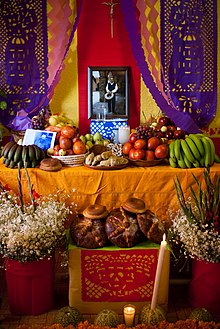Portal:Religion
The Religion Portal
Religion is a range of social-cultural systems, including designated behaviors and practices, morals, beliefs, worldviews, texts, sanctified places, prophecies, ethics, or organizations, that generally relate humanity to supernatural, transcendental, and spiritual elements—although there is no scholarly consensus over what precisely constitutes a religion. Different religions may or may not contain various elements ranging from the divine, sacredness, faith, and a supernatural being or beings. (Full article...)
 Vital article
Vital article
Hinduism (/ˈhɪnduˌɪzəm/) is an umbrella-term for a broad range of Indian religious and spiritual traditions (sampradayas)[1] that are unified by the concept of dharma ('Hindu dharma'), a universal order maintained by its followers through rituals and righteous living. The word Hindu is an exonym, and while Hinduism has been called the oldest religion in the world, it has also been described as Sanātana Dharma (lit. 'eternal dharma'), a modern usage, based on the belief that its origins lie beyond human history, as revealed in the Hindu texts. Another endonym for Hinduism is Vaidika Dharma (lit. 'Vedic dharma'). (Full article...)
 Did you know (auto-generated)
Did you know (auto-generated)
- ... that religious studies scholar C. Jouco Bleeker believed that religions are like acorns?
- ... that a religious community is a group of people who practice the same religion, but do not have to live together?
- ... that Freedom of Religion South Africa filed an unsuccessful lawsuit to keep child spanking legal?
- ... that the Grave with the Hands commemorates a married couple, divided by society and religion, with hands clasped over a cemetery wall after death?
- ... that the capital of South Ossetia once had more Jews than Ossetians?
- ... that Gamaliel's principle has been used to support religious pluralism and reforms within religious groups?

Jesus (c. 6 to 4 BC – AD 30 or 33), also referred to as Jesus Christ, Jesus of Nazareth, and many other names and titles, was a 1st-century Jewish preacher and religious leader. He is the central figure of Christianity, the world's largest religion. Most Christian denominations believe Jesus to be the incarnation of God the Son and the awaited messiah, or Christ, a descendant from the Davidic line that is prophesied in the Old Testament. Virtually all modern scholars of antiquity agree that Jesus existed historically. Accounts of Jesus's life are contained in the Gospels, especially the four canonical Gospels in the New Testament. Academic research has yielded various views on the historical reliability of the Gospels and how closely they reflect the historical Jesus. (Full article...)
Top 10 WikiProject Religion Popular articles of the month
 Subcategories
Subcategories
Topics
 Get involved
Get involved
- ^ Holberg (2000), p. 316; Nicholson (2013), pp. 2–5; McDaniel (2007), pp. 52–53; Michaels (2004), p. 21.

































































